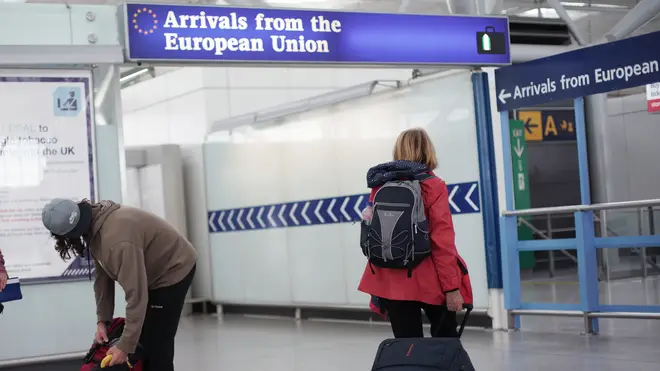
Ian Payne 4am - 7am
10 December 2020, 12:01

Travel to the EU could be restricted after the Brexit transition period expires at the end of the month due to rules aimed at combatting Covid-19, it has been reported.
Non-essential visits to the EU by UK citizens will be hit by curbs, according to the Financial Times.
Most UK residents will face restrictions on visiting the remaining 27 members of the EU from January 1 when rules permitting free travel within the bloc cease to apply to Britons, the newspaper said.
Read more: EU lays out contingency measures in the event of no-deal Brexit
Foreign Secretary Dominic Raab acknowledged that travel could be disrupted across Europe.
He said on Thursday: "Covid restrictions will depend on the combination of what the EU decides, but also member states.
"We have already got challenges with that and we have put our own restrictions in place."

UK 'not going to give up basic points of democratic principle'
He also acknowledged that coronavirus "remains a live issue and we need to make sure we have got control of it".
"I'm afraid restriction on travel, inevitably, is going to be something that is kept under review."
Read more: Dominic Raab: I'll do whatever it takes to get a Brexit deal, including working Christmas Day
Read more: MPs could sit in the Commons 'until Christmas Eve' to pass Brexit Bill
Asked whether that would mean Britons will find it difficult to go to the European mainland, he said: "It all depends on the prevalence of the virus in those continental European countries."

Labour MP Ben Bradshaw talks to LBC on Brexit trade-talks
A earlier statement issued by a Government spokeswoman said: "We take a scientific, risk-based approach to health measures at the border, and it is of course in the interests of all countries to allow safe international travel as we emerge from the pandemic."
The formal end of the transition period on December 31 means Britons will face an EU regime that only allows non-essential travel from a very limited number of non-EU countries, the Financial Times reported.
Most UK citizens would only be able to travel to the EU if individual states make provisions for such a move, or the bloc as a whole lessens its pandemic travel curbs, the newspaper said.
Read more: Michael Gove tells LBC 'significant political shove' is needed in Brexit negotiations
Read more: 'Very large gaps remain' after Brexit deal talks end in Brussels

'The PM promised a break from Brexit...How's that going?'
Paul Charles, chief executive of travel consultancy the PC Agency, said: "I cannot believe that EU countries who rely on the spending power of UK business and leisure travellers will seek to block entry after January 1.
"Cool heads need to prevail at this politically difficult time as travel and tourism is such a key contributor to economic growth in Europe.
"I'm sure that individual countries who need UK tourism will be sensible and override any EU-bloc decision which prevents entry. It is so important now for countries to work together globally to create a consistent approach."
A spokesman for travel trade organisation Abta said: "The EU has sought to adopt a common approach to travel restrictions, but this is only a recommendation and individual countries are able to implement their own measures, including options like travel corridors and testing.
"It is too early to say what restrictions might be in place on January 1 given the uncertain nature of the pandemic, but we know that UK travellers are hugely important to a number of EU destinations, including some winter sun favourites like the Canary Islands and Madeira."